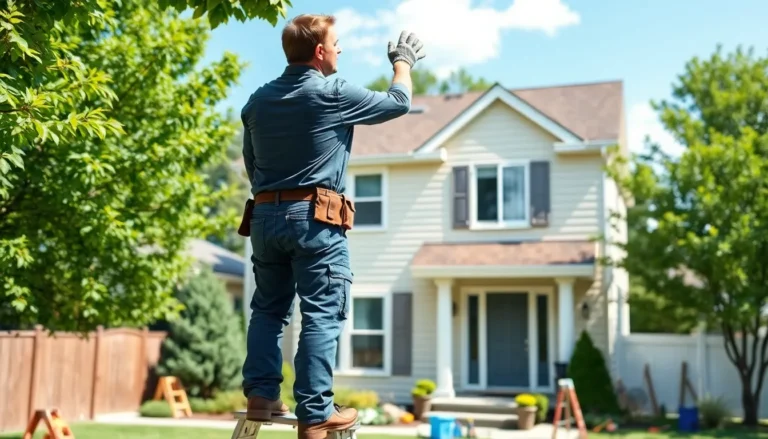Imagine walking into your home to the perfect temperature, no matter the season. Smart climate control makes this dream a reality, blending technology with comfort in ways that’ll make your thermostat weep with joy. Gone are the days of wrestling with clunky dials or arguing over the ideal setting. Now, your home can learn your preferences and adjust itself—like a butler who never forgets your favorite drink order.
Table of Contents
ToggleOverview of Smart Climate Control
Smart climate control systems offer seamless comfort in residential environments. These technologies utilize sensors and algorithms to understand individuals’ preferences, adjusting temperature and humidity levels automatically. By learning patterns over time, smart systems can optimize energy usage without sacrificing comfort.
Users benefit from enhanced energy efficiency, reducing utility bills considerably. A recent study by the U.S. Department of Energy indicates a potential savings of up to 10 percent on energy costs with smart thermostats in place. Many smart devices include smartphone compatibility, allowing control from anywhere at any time.
Integration with smart home ecosystems is another significant benefit. They can communicate with other intelligent devices, such as smart lights and security systems, providing a comprehensive home automation experience. For instance, a user can schedule the HVAC system to respond to natural light changes, maintaining comfort throughout the day.
Security and convenience further enhance the appeal of smart climate control. Alerts notify users about unusual temperature changes, which could indicate HVAC issues or potential emergencies. Additionally, some systems allow for geofencing features, automatically adjusting settings based on user location.
Wide-ranging compatibility exists with various home heating and cooling systems, minimizing installation hassles. The flexibility to choose different brands and devices enables homeowners to create customized solutions suited to their specific needs. With ongoing advancements in technology, smart climate control continues to evolve, promising even greater efficiency and comfort in the future.
Benefits of Smart Climate Control
Smart climate control systems offer numerous advantages that enhance home environments significantly.
Energy Efficiency
Reducing energy consumption remains a top priority for homeowners. Smart climate control systems achieve this through advanced algorithms that adjust temperature settings dynamically. These systems optimize heating and cooling based on user behavior, adapting over time to ensure efficient usage. According to a U.S. Department of Energy study, energy savings can reach up to 10 percent with these systems in place. Utilizing sensors, these smart systems detect unoccupied rooms, preventing unnecessary energy expenditure. Homeowners benefit not only from lower utility bills but also from a reduced carbon footprint, contributing to environmental sustainability.
Enhanced Comfort
Creating a personalized environment becomes effortless with smart climate control. Homeowners enjoy consistent temperatures throughout their living spaces, eliminating hot and cold spots. These systems learn individual preferences, automatically adjusting settings for optimal comfort at any time. Remote access via smartphones allows users to modify conditions even when away from home. Additionally, integration with smart home ecosystems enhances user experience by synchronizing with other devices, such as lights and security cameras. The ability to receive alerts for temperature fluctuations ensures peace of mind, making homes safer and more comfortable overall.
Key Features of Smart Climate Control Systems
Smart climate control systems come equipped with multiple advanced features designed to enhance user experience and efficiency.
Automation and Scheduling
Automation simplifies daily routines by allowing users to set specific temperature preferences based on their schedules. Schedules can be customized to match daily activities, ensuring comfort when it’s needed most. These systems automatically adjust settings according to preset parameters, promoting energy savings during unoccupied hours. Users can even program temperature changes for specific times, such as cooling the home before they arrive. This proactive approach leads to more efficient energy consumption while maintaining a pleasant living environment.
Remote Access and Control
Remote access offers significant convenience for users. Mobile apps enable homeowners to monitor and adjust their climate control systems from anywhere. Notifications for temperature fluctuations ensure users remain informed about their home’s condition. Control over settings provides an added layer of comfort when traveling. This feature also supports voice commands, integrating seamlessly with smart home systems. Users can enjoy a personalized atmosphere without being physically present, improving their overall quality of life.
Popular Smart Climate Control Technologies
Smart climate control technologies enhance home comfort and energy efficiency. Many homeowners rely on these technologies to optimize their living environments.
Smart Thermostats
Smart thermostats empower users to manage their home’s temperature intelligently. These devices learn user preferences over time and automatically adjust settings accordingly. Features include remote access through smartphones, allowing adjustments from anywhere. Some models provide energy consumption reports, helping residents track usage and identify savings opportunities. Notably, studies show that proper use of smart thermostats can lower energy bills by up to 10%. Compatibility with voice assistants streamlines operation, making it easier to change settings hands-free.
Home Automation Integration
Home automation integration enhances the functionality of smart climate control systems. Users can synchronize their thermostats with various smart home devices, such as lights, security systems, and window shades. By doing this, households achieve comprehensive automation, where temperature adjustments align with other home activities. For instance, lights can dim when the thermostat lowers the temperature for movie night. Geofencing technology adds another layer of convenience, automatically adjusting settings as residents leave or approach home. This interconnected system optimizes energy efficiency while providing unparalleled comfort and convenience.
Challenges and Considerations
Smart climate control systems face several challenges that can impact their effectiveness. Data privacy concerns arise from the collection of personal information and usage patterns by these devices. Many users worry about unauthorized access to their data or how it might be used by third parties.
Compatibility with existing HVAC systems presents another consideration. Not all smart climate control products integrate seamlessly with every heating and cooling system, leading to potential installation challenges. Homeowners should evaluate compatibility to ensure optimal performance.
User adoption can also pose a challenge. Some individuals may resist technology or struggle to adapt to new devices. Comprehensive user education remains essential to ensure users maximize the benefits of smart climate control solutions.
Costs associated with smart climate control systems should not be overlooked. While these systems can reduce utility bills, initial investment costs for purchasing and installing devices may be significant. Budgeting for current and future energy savings alongside upfront costs becomes necessary.
Dependence on stable internet connectivity factors into system reliability. Inconsistent connections can disrupt system performance and hinder remote access capabilities. Users may need to consider backup solutions or alternative configurations to counteract connectivity issues.
Finally, ongoing maintenance is required to keep smart climate control systems functioning correctly. Regular software updates and hardware checks help maintain efficiency. Homeowners should plan routine inspections to avoid any performance declines over time.
Smart climate control systems represent a significant advancement in home comfort and energy efficiency. By adapting to individual preferences and learning user habits, these systems not only enhance convenience but also promote sustainability. Homeowners can enjoy the benefits of reduced energy bills and a consistent living environment while integrating their systems with other smart devices for a seamless experience.
Despite some challenges like data privacy concerns and installation compatibility, the advantages far outweigh the drawbacks. As technology evolves, smart climate control will continue to offer innovative solutions tailored to modern lifestyles. Embracing these systems paves the way for a more comfortable and eco-friendly home, making it a worthwhile investment for the future.




